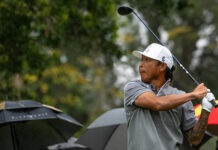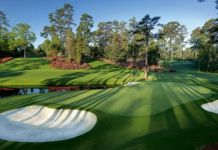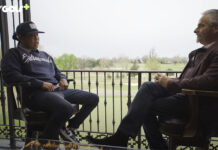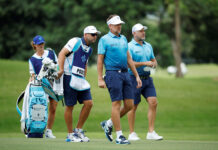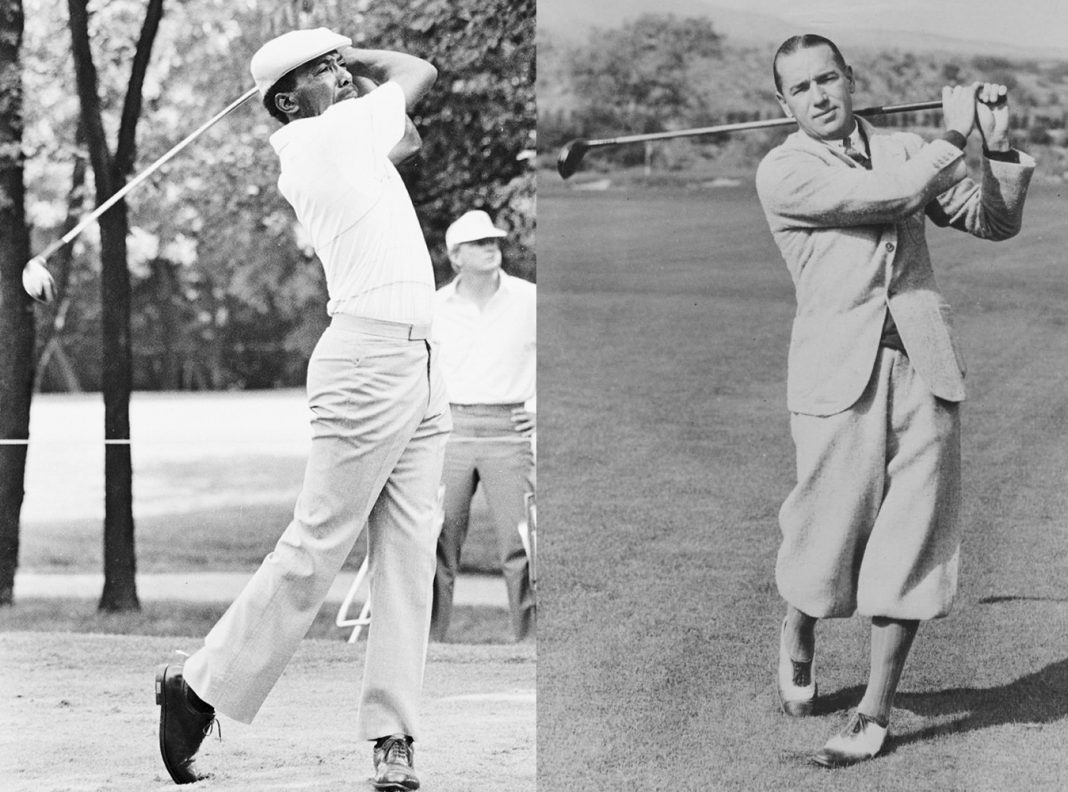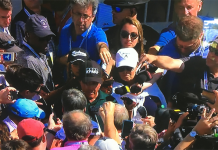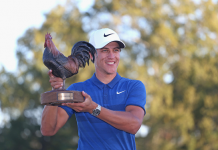The PGA Tour is setting up shop this week in Detroit, Michigan for the third edition of the Rocket Mortgage Classic.
A northern state, Michigan is known more for its hockey than golf, but it does have a solid history with the game, starting with Oakland Hills, one of the country’s most iconic golf courses. The Donald Ross design has played host to six U.S. Opens, three PGA Championships, and a Ryder Cup (2004).
As for the state’s greatest golfers, any list of the best from the Great Lakes State always starts with Walter Hagen, and usually includes the likes of Horton Smith, Leo Diegel, Dave Hill, and Calvin Peete. After that, it’s up for debate.
Here’s our list of the 10 greatest Michigan golfers, ahead of the Rocket Mortgage Classic.
1. Walter Hagen
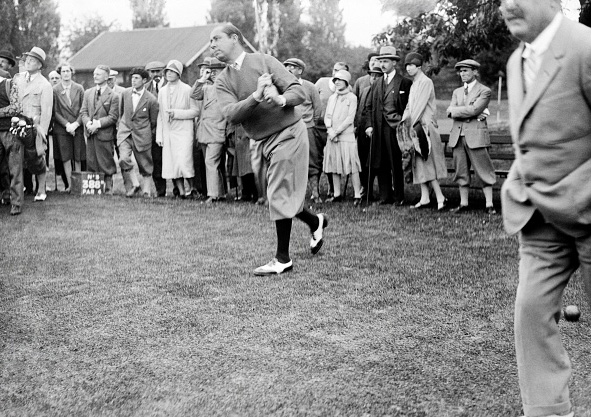
Hagen’s tally of 11 professional majors is third behind only Jack Nicklaus (18) and Tiger Woods (15). Known as the “father of professional golf,” he brought publicity, prestige, big prize money and lucrative endorsements to the sport. Hagen is regularly rated one of the greatest golfers ever – in the world, not just Michigan.
Hagen won the U.S. Open twice, and in 1922 he became the first native-born American to win the British Open, and won the Claret Jug three more times. He also won the PGA Championship a record-tying five times (all in match play), and the Western Open five times when it had near-major championship status.
Hagen totaled 45 PGA wins in his career, and was a six-time Ryder Cup captain.
Hagen battled throat cancer for over four years and had several operations. Two years before his death, he was honored with a testimonial dinner in August 1967 in Traverse City, Michigan, attended by major champions Arnold Palmer and Cary Middlecoff.
2. Horton Smith
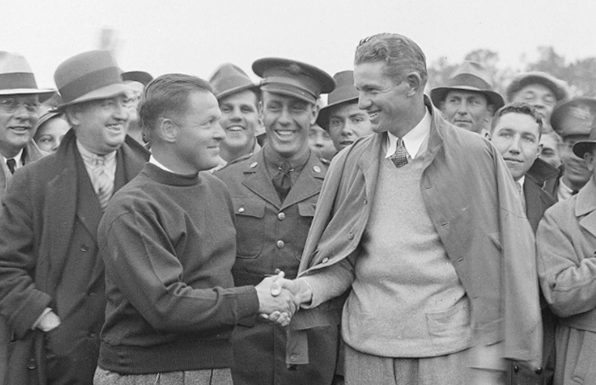
Smith is well known for winning the first Masters, and following it up with a second victory in the third edition. But he finished his golf career with 36 professional wins, spanning from 1928-1941. His best year occurred in 1929, winning eight (8) times.
Smith was part of five U.S. Ryder Cup teams (1929, 1931, 1933, 1935, and 1937).
Born in Springfield, Missouri, Smith turned pro in 1926, and won his first pro event in 1928. The PGA Tour wasn’t founded until 1934, and Smith was one of its leading players in the early years, topping the money list in 1936 which included his Masters win. Smith accumulated 30 PGA Tour titles in total, the last of them in 1941, before heading off to war.
In the prime of his career, Smith was drafted into the U.S. Army during World War II, and was honorably discharged as a captain. After the war, in 1946, Smith became the club pro at Detroit Golf Club in Michigan, where he remained until his death.
He was president of the PGA of America from 1952 to 1954.
Smith died in 1963 at age 55 of Hodgkin’s disease in Detroit. He was the first of the former Masters champions to pass away.
3. Leo Diegel
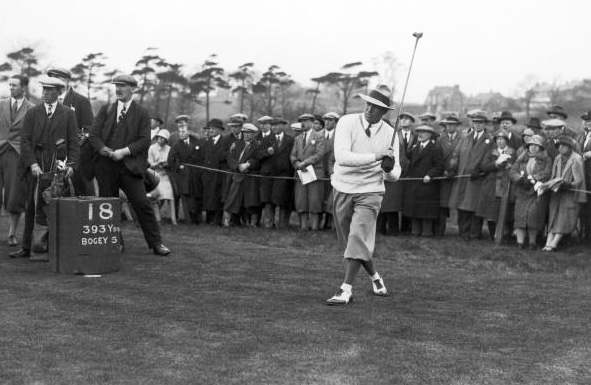
Born in Gratiot Township, Wayne County, Michigan, Diegel began caddying at age 10 and won his first significant event at age 17, the 1916 Michigan Open.
Diegel was a runner-up in his first U.S. Open in 1920, but would go on to win 28 PGA circuit events from 1920 to 1934, including two PGA Championships.
He was a four-time winner of the Canadian Open (1924–25, 1928–29) – a record for that event. In 1925, Diegel outperformed over 100 competitors to win the Florida Open (billed as the “Greatest Field Of Golfers Ever to Play in Florida”) at the Temple Terrace Golf and Country Club.
Diegel was selected for the first four Ryder Cup teams in 1927, 1929, 1931, and 1933.
His greatest season was 1928, with wins at the Canadian Open and the PGA Championship, where he stopped the four-year winning streak of Walter Hagen. Diegel defeated him in the quarterfinal to avenge earlier defeats in the 1925 quarterfinal and the 1926 final.
Diegel achieved the rare feat of defending both titles successfully in 1929, this time defeating Hagen in the semifinals of the PGA. Diegel was a runner-up to Bobby Jones at the British Open in 1930.
Diagnosed with throat and lung cancer in 1947, Diegel died at home at age 52 in North Hollywood, California where he had taken a position there as a club professional after scaling back his tour play. He was buried in Detroit.
4. Dave Hill
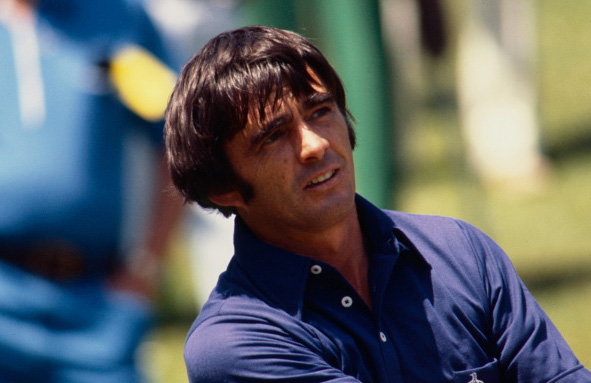
Hill was born in Jackson, Michigan. He attended the University of Detroit, where he played on the golf team. Hill won 13 times on the PGA Tour, three of which came during his career year of 1969, when he also won the Vardon Trophy for lowest scoring average. He was a member of the United States Ryder Cup team in 1969, 1973, and 1977.
Hill was also known for being a hothead, frequently leading the tour in fines and was once suspended for two months after he deliberately broke his putter on national television.
Like Hagen, Hill also captured the Michigan Open title (1959).
Hill died on September 27, 2011 in Jackson, Michigan after spending the last few years of his life battling emphysema.
5. Calvin Peete
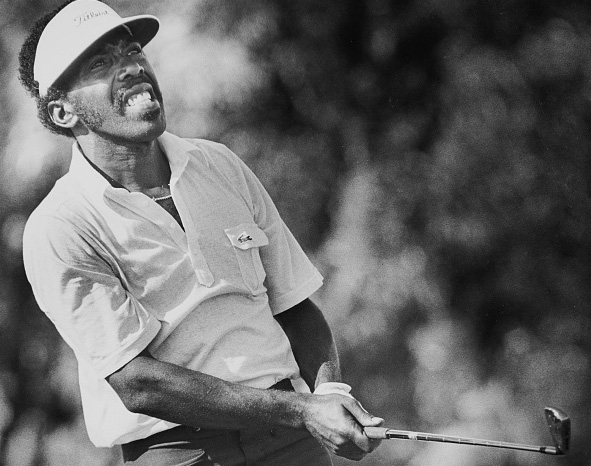
Peete is a Detroit native, and one of the greatest Black golfers to ever play the game, racking up 12 PGA Tour wins – 11 of those in a five-season stretch where he claimed a victory each year, highlighted by four seasons with at least two wins.
Peete finished in the top-5 of the PGA Tour money list three times: 1982, 1983 and 1985. He was ranked in the top 10 on the McCormack’s World Golf Rankings in 1984, the predecessor of the Official World Golf Rankings. At 43, he was ranked in top 10 of the Official World Golf Ranking for several weeks when it debuted in 1986.
Peete played on the 1983 and 1985 U.S. Ryder Cup teams. He won the Vardon Trophy for lowest scoring average in 1984.
Peete was well-known for driving accuracy as he won that statistical title for 10 consecutive years on Tour (1981-90), despite a less-than-normal swing due to breaking his elbow falling from a tree as a child and it not healing correctly.
He was inducted into the African American Ethnic Sports Hall of Fame in 2002. Peete died of lung cancer, in Atlanta, Georgia, on April 29, 2015. He was 71.
6. Walter Burkemo
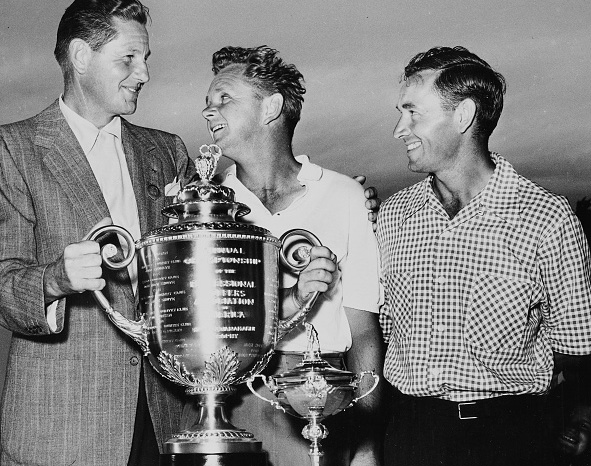
Born in Detroit, Michigan, Burkemo was the youngest of 13 children of Norwegian immigrants who settled in the Motor City. Burkemo began in golf at the age of 8 by caddying at Lochmoor Country Club in Detroit.
Burkemo won his first title at 19 in 1938 at the Southern Florida Open, however, World War II intervened soon thereafter and he found himself drafted into the U.S. Army. Burkemo served in the infantry as a sergeant in the European Theater. He was seriously wounded twice, earning two Purple Hearts, the second time during the Battle of the Bulge.
Burkemo resumed his PGA Tour career after the war while recovering from his injuries but had little success until 1951 when his luck began to change when he won his first of four Michigan Opens.
His best years in professional golf were in the early 1950s when he won the 1953 PGA Championship, and was runner-up in 1951 and 1954. Although he was one of the most consistent top-10 finishers on the tour, he would go on to win only one more event, the Mayfair Inn Open in 1957. He was a member of the Ryder Cup team in 1953.
The 1953 PGA Championship was played in July at Birmingham Country Club in Birmingham, Michigan, only six miles from the Franklin Hills Country Club where Burkemo was club pro. He benefited from a so-called “home field advantage” because during the match play era, the PGA Championship was a marathon of double rounds for five straight days. He also benefited from the fact that Ben Hogan, the reigning Masters and U.S. Open champion, was in Scotland to practice and qualify for the British Open, which started the day after the PGA Championship final match.
After the 1954 season, Burkemo returned to life as a club pro because the grind of the PGA Tour was proving too difficult for him to maintain with a wife and four children. He continued to play the tour part-time for the rest of his career. He and his brother Vic opened Burkemo’s driving range in St. Clair Shores.
Burkemo was inducted into the Michigan Sports Hall of Fame and the Michigan Golf Hall of Fame. He died in Fenton a day before his 68th birthday.
7. Al Watrous
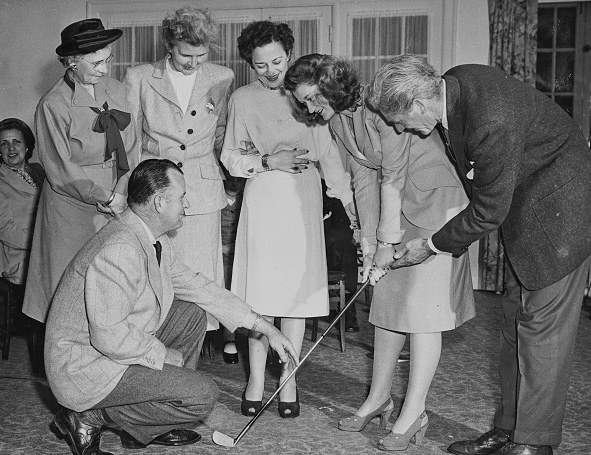
Born in Yonkers, New York, Watrous moved to Michigan at an early age and played on the first two Ryder Cup teams in 1927 and 1929. Watrous was the club pro at Oakland Hills Country Club in Bloomfield Hills, Michigan, for 37 years. He won eight times on the PGA circuit tour, but had tremendous success in Michigan events, winning the Michigan PGA Championship nine (9) times and the Michigan Open six (6) times.
Watrous finished in the top 10 in all four majors, including a T3 at the PGA Championship, and a runner-up at the 1926 British Open Championship at Royal Lytham & St Annes Golf Club, losing on to the great Bobby Jones on the final two holes.
Watrous did win the PGA Seniors Championship three times after he turned 50.
He was inducted with the charter class at the Michigan Golf Hall of Fame. Watrous died on December 3, 1983, in Royal Oak, Michigan.
8. Mike Hill
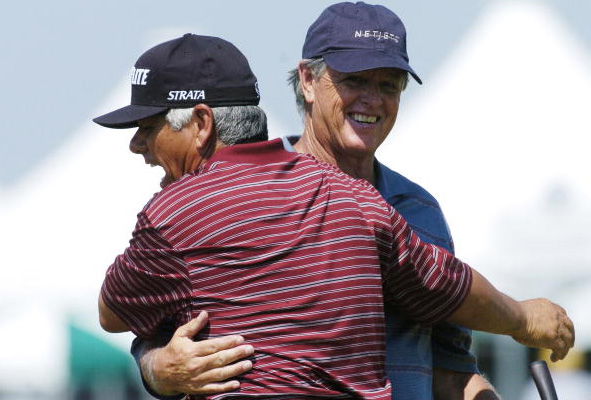
Hill is the brother of Dave. He wasn’t as accomplished as his older brother on the PGA Tour winning three times, but had one of the better runs on the Senior PGA Tour, now the ‘Champions Tour, claiming 18 titles, including 10 in two seasons – five (5) wins in both 1990 and 1991.
Hill, the younger brother of the late pro golfer Dave Hill, found most of his success on the PGA Senior Tour, where he was an 18-time winner from 1990-through-1996. Hill won five times in both 1990 and 1991. He also won three times on the PGA Tour, capturing the Doral-Eastern Open Invitational in 1970, the San Antonio Texas Open in 1972 and the Ohio Kings Island Open in 1977. Hill, 80, continues to live in the Jackson area.
Hill made 590 of 715 career starts and posted 162 top 10s. He earned $8.4 million. He currently resides in Brooklyn, Michigan.
9. Dan Pohl
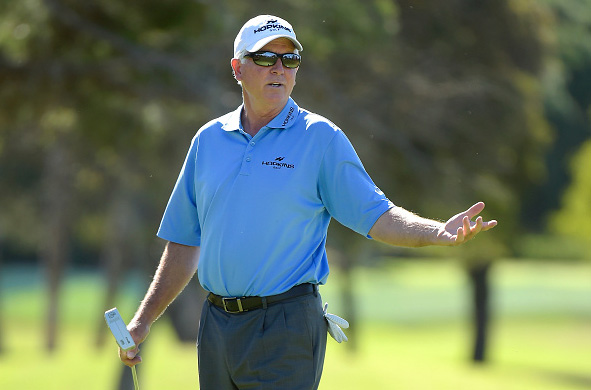
Pohl was born and raised in Mt. Pleasant, Michigan. He played over 20 years on the PGA Tour and recorded two wins – both in 1986 (Colonial National Invitational and NEC World Series of Golf). He finished with an amazing 70 top-10 finishes, including seven in major tournaments.
His best finish in a major was runner-up at the 1982 Masters Tournament where he lost to Craig Stadler in a playoff. He also had a third-place finish at both the 1981 PGA Championship and 1982 U.S. Open.
Pohl earned the Vardon Trophy, which is awarded to the golfer with the lowest average in 1987, the year of his lone Ryder Cup berth.
10. Lon Hinkle
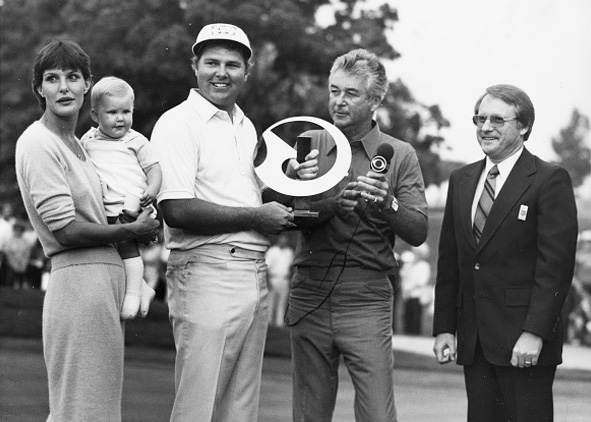
Hinkle was born in Flint, Michigan. He attended Santana High School in Santee, California, graduating in 1967. He then attended San Diego State University, where he was a member of the golf team. He turned pro and joined the PGA Tour in 1972.
Hinkle won three tournaments in his career on the PGA Tour, all of which came in the late 1970s. In 1979, he earned $247,693, finished 3rd on the money list, and won two Tour events, including the World Series of Golf.
That year in the first round of the U.S. Open at Inverness Club he took a shortcut, cutting the dogleg on the par-5 8th hole by hitting onto the 17th fairway. Overnight, USGA officials planted a tree (known ever afterwards as The Hinkle Tree) to block the shortcut.
His best finish in a major was a T3 at both the U.S. Open and the PGA Championship in 1980.
During his career on the PGA Tour, he had more than 50 top-10 finishes. He also played on the European Tour occasionally.
In 1981, Hinkle won the World Long Drive Championship.
Hinkle lives in Bigfork, Montana.


